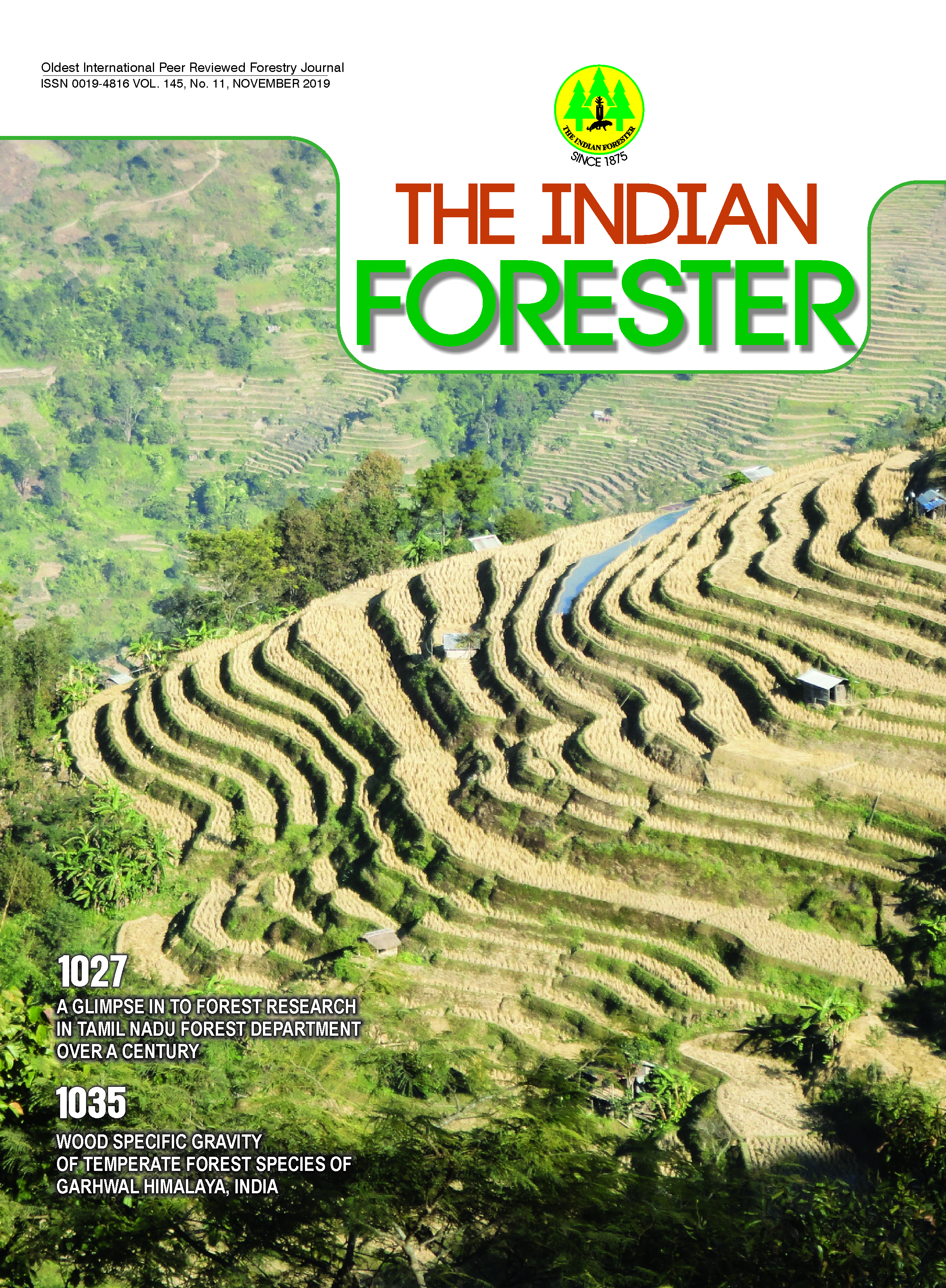Efficacy of Preservatives against Sapstain Fungi on Pinus radiata and Bombax ceiba
DOI:
https://doi.org/10.36808/if/2019/v145i11/149928Keywords:
Alternaria Alternata, Bombax ceiba, Pinus radiata, Preservatives, Sap Stain.Abstract
Pinus radiata and Bombax ceiba are susceptible to discoloration by sap stain fungus i.e. Alternaria alternata resulting significant losses of raw material for the wood industries. In the present study, efficacy of CCA, CCB, Borax-Boric acid and ZiBOC was tested against sap stain fungi on Pinus radiata and Bombax ceiba under laboratory conditions. Results showed least fungal infestation in Pinus radiata treated with CCB and ZiBOC followed by CCA and Borax-Boric acid by Alternaria alternata. Whereas, in case of Bombax ceiba, minimum growth of Alternaria alternata was noted in samples treated with ZiBOC followed by CCA, CCB and BBA.References
Anon., (2018). What causes cancer? https://www.cancer.org/cancer/cancer-causes/ arsenic.html. Retrieved on 23 November 2018.
AS5604. (2003). Australian Standard: Timber-Natural durability ratings. Standards Australia: Sydney.
ASTM D4445-09a (2009). Standard Test Method for Fungicides for Controlling Sapstain and Mold on Unseasoned Lumber (Laboratory Method), DOI: 10.1520/D4445-09A. ASTM International.
Bootle R.K. (2005). Wood in Australia: Types, properties and uses. The McGraw Hill Companies. 452pp.
Datar V.V. (1995). Antifungal activity of Neem (Azadirachta indica) leaves against some phytopathogenic fungi, In: V. Mariappan (eds), Neem for the management of crop diseases. Associated Publishing Co. New Delhi India, 49-51.
FSI 2017. Forest Survey of India. Indian states of forest reports 2017. Chapter 2. Forest cover. Pp 16.
Kim G.H., Kang S.M. and Morrell J.J. (1999). Laboratory evaluation of selected anti-stain chemicals for control of fungal staining on Ginkgo sapwood. Forest Products Journal, 49(3): 49-52.
Kim J.J., Ra J.B., Son D.S. and Kim G.H. (2001). Fungi colonizing sapwood of Japanese red pine logs in storage. Mycobiology, 29(4): 205-209.
Morrell J.J., Love C.S. and Freitag C.M. (2002). Preventing discoloration of unseasoned hem-fir and Douglas-fir lumber with selected fungicide formulations. Forest products journal, 52(2): 53-61.
Purushotham A. (1970). Protection of pulpwood (timber, bamboo) from deterioration due to biological agencies (fungi and insects, etc.) during transit and storage. Journal of Timber Development Association India 16(2): 51-53.
Rawat M.S., Tripathi S. and Pant H. (2015). Laboratory evaluation of ZiBOC and CCA as an Antisapstain on Populus deltoides. Journal of Eco-friendly Agriculture, 10(1): 82-86
Roff J.W., Cserjesi A.J. and Swann G.W. (1980). Prevention of sap stain and mold in packaged lumber. Forintek Canada Corporate Technical Report. 14R. Vancouver, BC: Forintek Canada Corporation.
Thompson R. (1991). The chemistry of wood preservation. 1st Edition, Woodhead Publishing, pp 316.
Downloads
Downloads
Published
How to Cite
Issue
Section
License
Unless otherwise stated, copyright or similar rights in all materials presented on the site, including graphical images, are owned by Indian Forester.





